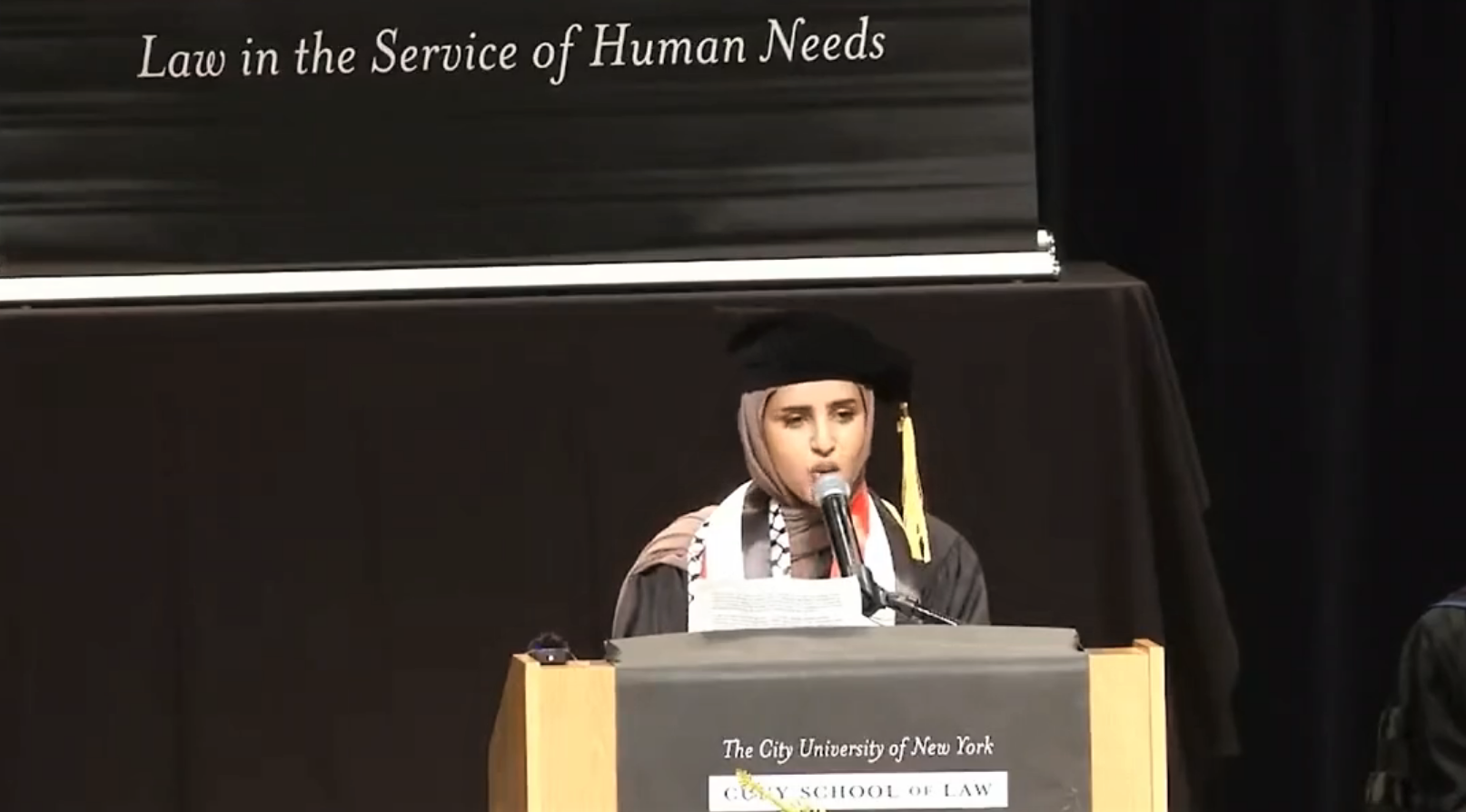A bill that Rep. Mike Lawler (R-N.Y.) introduced late last month, H.R.3773, which now has 14 co-sponsors, aims to amend the 1965 Higher Education Act to bar colleges and universities that host antisemitic events from being part of federal student loan and grant programs.
The legislation came after video footage came to light of a CUNY law student delivering an antisemitic commencement address on May 12. The talk, in part, accused Israel of continuing “to indiscriminately rain bullets and bombs on worshippers, murdering the old, the young, attacking even funerals and graveyards.”
“No college or university should receive a single dollar of federal education funding if they peddle in the promotion of antisemitism at an event on their campus,” Lawler stated. “CUNY should be ashamed of itself for allowing insidious anti-semitism to permeate on its campuses, and my bill will ensure they face stiff penalties if they continue to let hate have a home.”
‘A broader pattern of antisemitism’
JNS sought comment from every declared 2024 presidential campaign on whether the candidate, if elected, would direct his or her Education Department to defund CUNY or schools that act similarly.
“What happened at CUNY is outrageous. CUNY has become a hotbed of radical antisemitism in America, and it’s time to put our foot down,” Nikki Haley, a former U.S. ambassador to the United Nations, told JNS.
A Haley White House would have zero tolerance for antisemitism, the former South Carolina governor told JNS. “Institutions that engage in persistent antisemitism in violation of federal law should have their taxpayer funding pulled.”
Former vice president and current presidential candidate Mike Pence has publicly discussed defunding the Education Department entirely, which would make defunding CUNY individually a moot point.
He is “a champion of the Jewish people” who believes that “antisemitism has no place in America, including college campuses,” Devin O’Malley, a Pence spokesman, told JNS.
The Ron DeSantis campaign did not respond to several JNS queries; the Florida governor’s office told JNS that it cannot discuss questions beyond state policy. Jeremy Redfern, press secretary to Ron DeSantis, noted that the governor signed HB 741 into law in 2019, making religion a protected class with respect to discrimination in Florida’s public education institutions.
None of the other declared 2024 presidential candidates responded to multiple JNS queries for comment on whether an Education Department in their administration would defund CUNY.
That lack of response did not surprise Jay Greene, a senior education policy research fellow at the Heritage Foundation.
“The issue here is not the graduation speech but a broader pattern of antisemitism that is being allowed at CUNY and college campuses as a whole,” Greene told JNS. “For Jews and other minorities, CUNY was a vehicle of upward mobility. It is shocking to see how hostile it has become.”
Greene thinks a rise in diversity, equity and inclusion (DEI) staff at universities may be contributing to a rise in anti-Jewish hatred.
“DEI divides the world between oppressor and oppressed, in which hatred of the oppressor is justified,” Greene said. “According to this view, Israel is the oppressor. This is a radical concept that is completely at odds against the idea of equal treatment under the law.”

How much funding CUNY would be in jeopardy under H.R.3773 is not immediately clear. CUNY did not respond to a JNS query about how much federal, state and city funding it has received so far this academic year.
Of CUNY’s $4.3 billion 2023 fiscal year budget, the majority of funding comes from the state, according to the New York City comptroller.
“The city contributes just over $600 million, making up 14% of the overall CUNY budget, the vast majority of which (over 90%) is dedicated to CUNY Community Colleges,” per the comptroller’s office. CUNY received $186 million in federal pandemic aid, it added.
According to the CUNY site, students at the university “received a total of $770 million in need-based federal Pell grants and New York State Tuition Assistance Program (TAP) awards” in the past academic year. In February, CUNY announced $12 million in federal funding for campus programs.
CUNY’s total federal grants and contracts in the academic year ending June 30, 2022, was nearly $152.9 million, according to its statement of revenues, expenses and changes in net position.
‘A dangerous staging ground’
Arsen Ostrovsky, CEO of the International Legal Forum, has called for the Internal Revenue Service to investigate CUNY’s tax-exempt status and is asking the American Bar Association to look into whether CUNY School of Law should lose its accreditation.
The commencement talk “did not occur in a vacuum and was not an isolated incident,” he said. He noted that law school officials reviewed and pre-approved the speech. “The school has cultivated a deliberate and dangerous staging ground for the systematic promotion of antisemitism, BDS activities and anti-Zionism,” he said.
Brooke Goldstein, founder and executive director of the Lawfare Project, told JNS it is “very significant” that three presidential candidates thought the issue sufficiently important to comment upon.
“Unfortunately, as good of a start as this is, we need more. We cannot allow partisan politics to drive this narrative, and it’s crucial for candidates from both parties to stand up for our civil rights and for social justice for the Jewish people,” she said.
Ostrovsky and Goldstein think it is realistic to withhold CUNY’s federal funding if there is enough political will. Greene disagrees.
“Neither the Biden administration nor the State of New York is inclined to defund CUNY,” he said. “Democrats are stronger in New York, and the DEI movement is much stronger with Democrats compared to Republicans.”


























